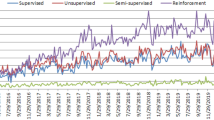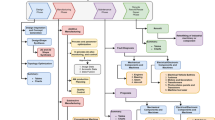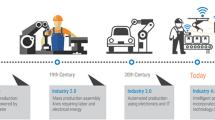Abstract
The manufacturing of complex parts, such as aircraft structural parts and aero-engine casing parts, has always been one of the focuses in the manufacturing field. The machining process involves a variety of hard problems (e.g. tool wear prediction, smart process planning), which require assumptions, simplifications and approximations during the mechanism-based modelling. For these problems, supervised machine learning methods have achieved good results by fitting input–output relations from plenty of labelled data. However, the data acquisition is difficult, time consuming, and of high cost, thus the amount of data in a single enterprise is often limited. To address this issue, this research aims to realise the equivalent manufacturing data sharing based on federated learning (FL), which is a new machine learning framework to use the scattered data while protecting the data privacy. An enterprise-oriented framework is first proposed to find FL participants with similar data resources. Then, the machining parameter planning task for aircraft structural parts is taken as an example to propose an FL model, which mines the knowledge and rules in the historical processing files from multiple enterprises. In addition, to solve the data difference among enterprises, domain adaptation method in transfer learning is used to obtain domain-invariant features. In the case study, a prototype platform is developed, and to validate the performance of the proposed model, a data set is built based on the historical processing files from three aircraft manufacturing enterprises. The proposed model achieves the best performance compared with the model trained only with the data from a single enterprise, and the model without domain adaptation.








Similar content being viewed by others
Abbreviations
- \({\mathbf{G}}\) :
-
Graph
- \({\mathbf{V}}\) :
-
Vertex set
- \(v_{i} ,v_{j}\) :
-
Vertex \(i\), vertex \(j\)
- \(n\) :
-
Total number of vertexes
- \({\mathbf{E}}\) :
-
Edge set
- \({\mathbf{A}}\) :
-
Adjacency matrix
- \({\mathbf{H}}\) :
-
Attribute matrix
- \({\varvec{h}}_{i}\) :
-
Attribute vector of vertex \(v_{i}\)
- \(r\) :
-
Dimension of the attribute vector
- \({\mathbf{C}}\) :
-
Relation matrix
- \(m\) :
-
Total number of machining operations
- \({\mathbf{W}}\) :
-
Learnable matrix used for linear transformation
- \({\varvec{a}}\) :
-
Learnable vector in attention coefficients calculation
- \(a_{ij}\) :
-
Attention coefficients
- \({\mathbf{H^{\prime}}}\) :
-
Output attribute matrix of graph convolution layers
- \({\varvec{h}}_{i}^{\user2{^{\prime}}}\) :
-
Attribute vector in \({\mathbf{H^{\prime}}}\)
- \({\varvec{o}}_{i}\) :
-
Machining operation
- \({\varvec{o}}_{i}^{area}\) :
-
Machining area of \({\varvec{o}}_{i}\)
- \({\varvec{G}}_{i}^{sub}\) :
-
Subgraph corresponding to \({\varvec{o}}_{i}^{area}\)
- \({\varvec{h}}_{cond}\) :
-
Representing vector of process information
- \({{\varvec{\uptheta}}}\) :
-
Training parameters of FL model
- \(F\) :
-
Feature extractor
- \(C\) :
-
Label classifier
- \(D\) :
-
Domain discriminator
- \(\theta_{f}\) :
-
Model parameters of feature extractor
- \(\theta_{c}\) :
-
Model parameters of label classifier
- \(\theta_{d}\) :
-
Model parameters of domain discriminator
- \(N\) :
-
Number of training samples
- \(L_{c}\) :
-
The loss of label classifier
- \(L_{d}\) :
-
The loss of domain discriminator
- \(K\) :
-
Number of FL clients
- \(n_{k}\) :
-
Number of samples that \(k\)-th client used
- \(T\) :
-
Total number of samples in an FL round
- \(x,y\) :
-
Private tensors
- \({\text{S}}_{0} ,{\text{S}}_{1}\) :
-
Two servers that share the secrete
- \({\text{S}}_{2}\) :
-
The server that generate crypto
References
Brisimi, T. S., Chen, R., Mela, T., Olshevsky, A., Paschalidis, I. C., & Shi, W. (2018). Federated learning of predictive models from federated electronic health records. International Journal of Medical Informatics, 112, 59–67. https://doi.org/10.1016/j.ijmedinf.2018.01.007
Dahl, M., Mancuso, J., Dupis, Y., DeCoste, B., Giraud, M., Livingstone, I., Patriquin, J., & Uhma, G. (2018). Private machine learning in tensorflow using secure computation. arXiv:1810.08130. https://doi.org/10.48550/arXiv.1810.08130
Damgård, I., Pastro, V., Smart, N., & Zakarias, S. (2012). Multiparty computation from somewhat homomorphic encryption. In CRYPTO 2012. Lecture Notes in Computer Science (Vol. 7417, pp. 643–662). Springer. https://doi.org/10.1007/978-3-642-32009-5_38.
Deng, T., Li, Y., Liu, X., Wang, P., & Lu, K. (2021). A data-driven parameter planning method for structural parts NC machining. Robotics and Computer-Integrated Manufacturing, 68, 102080. https://doi.org/10.1016/j.rcim.2020.102080
Fredrikson, M., Jha, S., & Ristenpart, T. (2015). Model inversion attacks that exploit confidence information and basic countermeasures. In Proceedings of the 22nd ACM SIGSAC Conference on Computer and Communications Security, 1322–1333. https://doi.org/10.1145/2810103.2813677.
Ganin, Y., & Lempitsky, V. (2015). Unsupervised domain adaptation by backpropagation. International Conference on Machine Learning, PMLR, 37, 1180–1189.
Han, X., Yu, H., & Gu, H. (2019). Visual inspection with federated learning. In International Conference on Image Analysis and Recognition (pp. 52–64). Springer. https://doi.org/10.1007/978-3-030-27272-2_5.
Hard, A., Rao, K., Mathews, R., Ramaswamy, S., Beaufays, F., Augenstein, S., Eichner, H., Kiddon, C., & Ramage, D. (2018). Federated learning for mobile keyboard prediction. arXiv:1811.03604. https://doi.org/10.48550/arXiv.1811.03604.
Kairouz, P., McMahan, H. B., Avent, B., Bellet, A., Bennis, M., Bhagoji, A. N., Bonawitz, K., Charles, Z., Cormode, G., Cummings, R., Oliveira, R. G. L., Rouayheb, S. E., Evans, D., Gardner, J., Garrett, Z., Gascon, A., Ghazi, B., Gibbons, P. B., Gruteser, M., & Zhao, S. (2019). Advances and open problems in federated learning. arXiv:1912.04977v1. https://doi.org/10.48550/arXiv.1912.04977.
Kingma, D. P., & Ba, J. (2014). Adam: a method for stochastic optimization. arXiv:1412.6980. https://doi.org/10.48550/arXiv.1412.6980.
Lecun, Y., Bengio, Y., & Hinton, G. (2015). Deep learning. Nature, 521(7553), 436–444. https://doi.org/10.1038/nature14539
Li, L., Fan, Y., Tse, M., & Lin, K. (2020). A review of applications in federated learning. Computers & Industrial Engineering. https://doi.org/10.1016/j.cie.2020.106854
Li, Y., Liu, C., Hua, J., Gao, J., & Maropoulos, P. (2019). A novel method for accurately monitoring and predicting tool wear under varying cutting conditions based on meta-learning. CIRP Annals, 68(1), 487–490. https://doi.org/10.1016/j.cirp.2019.03.010
Liu, Y., Kang, Y., Xing, C., Chen, T., & Yang, Q. (2020). A secure federated transfer learning framework. IEEE Intelligent Systems, 35(4), 70–82. https://doi.org/10.1109/MIS.2020.2988525
McMahan, B., Moore, E., Ramage, D., Hampson, S., & Arcas, B. A. (2017). Communication-efficient learning of deep networks from decentralized data. Artificial Intelligence and Statistics, PMLR, 54, 1273–1282.
Pfohl, S. R., Dai, A. M., & Heller, K. (2019). Federated and differentially private learning for electronic health records. arXiv:1911.05861. https://doi.org/10.48550/arXiv.1911.05861.
Ramaswamy, S., Mathews, R., Rao, K., & Beaufays, F. (2019). Federated learning for emoji prediction in a mobile keyboard. arXiv:1906.04329. https://doi.org/10.48550/arXiv.1906.04329.
Saputra, Y. M., Hoang, D. T., Nguyen, D. N., & Dutkiewicz, E. (2019). Energy demand prediction with federated learning for electric vehicle networks. In 2019 IEEE Global Communications Conference (GLOBECOM), IEEE (pp. 1–6). https://doi.org/10.1109/GLOBECOM38437.2019.9013587.
Sozinov, K., Vlassov, V., & Girdzijauskas, S. (2018). Human activity recognition using federated learning. In 2018 IEEE Intl Conf on Parallel & Distributed Processing with Applications, Ubiquitous Computing & Communications, Big Data & Cloud Computing, Social Computing & Networking, Sustainable Computing & Communications (ISPA/IUCC/BDCloud/SocialCom/SustainCom), IEEE (pp. 1103–1111). https://doi.org/10.1109/BDCloud.2018.00164.
Sung, F., Yang, Y., Zhang, L., Xiang, T., Torr, P. H. S., & Hospedales, T. M. (2018). Learning to compare: Relation network for few-shot learning. In Proceedings of the IEEE conference on computer vision and pattern recognition (pp. 1199–1208). https://doi.org/10.1109/CVPR.2018.00131.
Veličković, P., Cucurull, G., Casanova, A., Romero, A., Lio, P., & Bengio, Y. (2017). Graph attention networks. arXiv:1710.10903. https://doi.org/10.48550/arXiv.1710.10903.
Wang, P., Gao, R., & Yan, R. (2017). A deep learning-based approach to material removal rate prediction in polishing. CIRP Annals, 66(1), 429–432. https://doi.org/10.1016/j.cirp.2017.04.013
Wu, Q., Ding, K., & Huang, B. (2018). Approach for fault prognosis using recurrent neural network. Journal of Intelligent Manufacturing. https://doi.org/10.1007/s10845-018-1428-5
Xu, X., Wang, L., & Newman, S. T. (2011). Computer-aided process planning—A critical review of recent developments and future trends. International Journal of Computer Integrated Manufacturing, 24(1), 1–31. https://doi.org/10.1080/0951192X.2010.518632
Yang, T., Andrew, G., Eichner, H., Sun, H., Li, W., Kong, N., Ramage, D., & Beaufays, F. (2018). Applied federated learning: Improving google keyboard query suggestions. arXiv:1812.02903. https://doi.org/10.48550/arXiv.1812.02903.
Zhang, Z., & Saligrama, V. (2015). Zero-shot learning via semantic similarity embedding. In Proceedings of the IEEE international conference on computer vision (pp. 4166–4174). https://doi.org/10.1109/ICCV.2015.474.
Zhao, Z., Li, Y., Liu, C., & Gao, J. (2020). On-line part deformation prediction based on deep learning. Journal of Intelligent Manufacturing, 31(3), 561–574. https://doi.org/10.1007/s10845-019-01465-0
Zhao, Y., Li, M., Lai, L., Suda, N., Civin, D., & Chandra, V. (2018). Federated learning with non-iid data, arXiv:1806.00582. https://doi.org/10.48550/arXiv.1806.00582.
Funding
Funding was provided by National Natural Science Foundation of China (Grant Nos. 51925505, U21B2081).
Author information
Authors and Affiliations
Corresponding author
Additional information
Publisher's Note
Springer Nature remains neutral with regard to jurisdictional claims in published maps and institutional affiliations.
Rights and permissions
About this article
Cite this article
Deng, T., Li, Y., Liu, X. et al. Federated learning-based collaborative manufacturing for complex parts. J Intell Manuf 34, 3025–3038 (2023). https://doi.org/10.1007/s10845-022-01968-3
Received:
Accepted:
Published:
Issue Date:
DOI: https://doi.org/10.1007/s10845-022-01968-3




